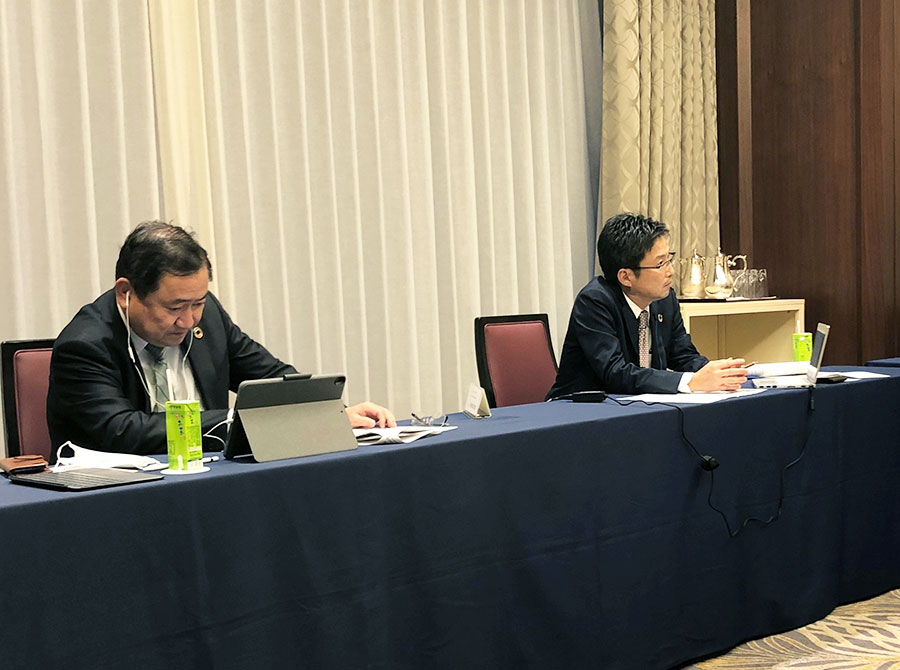
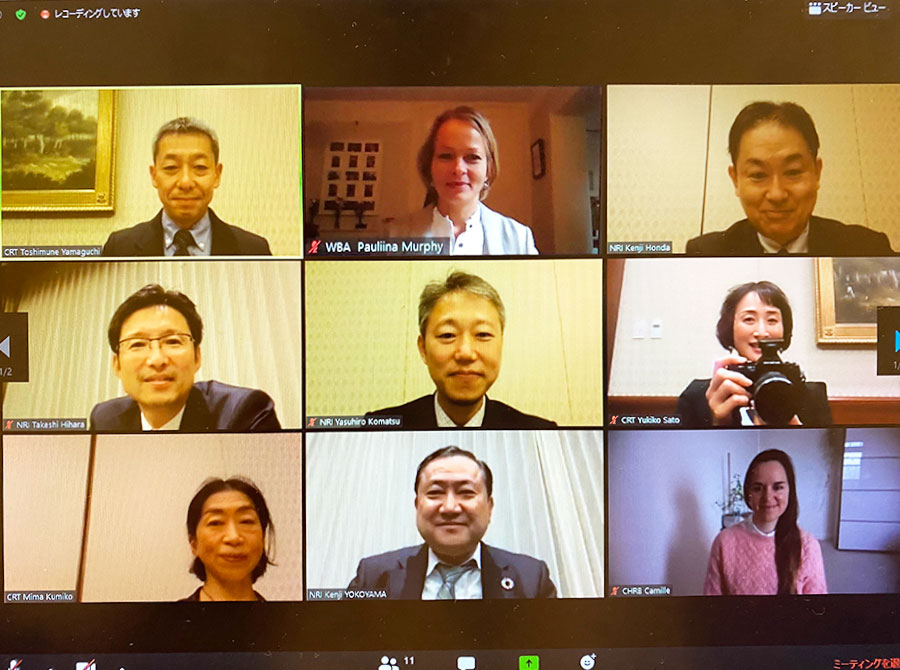
On October 15, 2020, Nomura Research Institute (NRI) held a dialog with the World Benchmarking Alliance (WBA), an international NGO promoting the sustainable development goals (SDGs).
In 2019, the WBA merged with the Corporate Human Rights Benchmark (CHRB), an international initiative regarding business and human rights.
This is our fourth dialog with overseas experts, and this year we held it online to prevent the spread of COVID-19. During the dialog, we exchanged opinions regarding themes such as corporate assessment from the view of SDGs and the disclosure of activities related to human rights.
Participants
(Affiliation and position as of October 2020)

Ms.Pauliina Murphy
World Benchmarking Alliance, Engagement Director
Ms. Pauliina leads the WBA`s advocacy and outreach strategy for the WBA and its benchmarks, building and strengthening relationships with diverse stakeholders, including investors, civil society and governments, working to ensure that the Alliance is inclusive and relevant globally. She joined the WBA from Aviva, a global insurance company and asset manager, where she was Head of International Government Engagement.
At Aviva, She drove forward international policy development and advocacy campaigns on sustainable finance and trade and investment, working closely with multi-lateral institutions such as the UN, G7 and G20. She ran the company’s global stakeholder and political engagement strategy, to change the rules at the highest level so that capital is deployed to drive sustainable growth.

Ms. Camille Le Pors
World Benchmarking Alliance, Lead Corporate Human Rights Benchmark
Ms. Camille leads the Corporate Human Rights Benchmark (CHRB) at WBA. She joined the CHRB in October 2016, and has overall responsibility for producing methodologies and benchmark reports of key companies in high human-rights risk sectors & engagement with stakeholders to further the use of the data and methodologies.
Prior to this she spent time working with the Business and Human Rights Resource Centre in London, the International Criminal Court in The Hague, and for an Overseas Member of French Parliament in London. She holds a BA in International Politics from King’s College London and a Masters in International Affairs with a focus on business and human rights from the IHEID, Geneva and Fudan University, Shanghai.
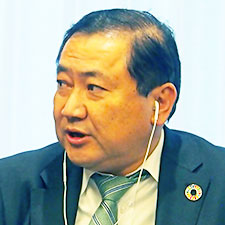
Kenji Yokoyama
Senior Corporate Managing Director, NRI
Mr. Yokoyama leads initiatives for promoting sustainability and solution for social issues through NRI business, based on middle- and long-term perspective. He is in charge of sustainability, global operation planning, corporate communication, administration, operations and control, and procurement, accounting and finance.

Takeshi Hihara
Senior Managing Director, NRI
Mr. Hihara is in charge of business strategy, legal affairs, and intellectual property. Vice person in charge of corporate communication and general affairs.
Promotes business strategy to achieve sustainable growth at NRI based on the NRI policy of Sustainability Management.
Other participants from NRI
Yasuhiro Komatsu, General Manager, Corporate Communication Department
Kenji Honda, Manager, Sustainability & Responsibility Group
Facilitator
Toshimune Yamaguchi, Director, Caux Round Table Japan
CSR dialogue with World Benchmarking Alliance
Corporate assessment from the view of SDGs
Yokoyama(NRI):What expectations do you have for NRI regarding corporate assessment from the view of SDGs??
Ms. Pauliina Murphy:
The SDGs are a roadmap for heading toward a sustainable and better world, but they do not explicitly state what is required of companies that conduct business. In order to accomplish the SDGs and achieve a sustainable society, we focus on the seven fields indicated below that require transformation, and have identified 2,000 companies that are major players in those fields. We are currently working on developing benchmark indices for evaluating corporate performance by 2023.
- Social: Achieving a sustainable society by respecting human rights and rectifying inequality
- Circular: Ensuring sustainable forms of production and consumption
- Food and agriculture: Ensuring the food required for all people to live a healthy life
- Decarbonisation and energy: Ensuring universal access to sustainable energy and decarbonisation
- Digital: Utilizing digital technologies to provide all people with safe information technology infrastructure
- Urban: Achieving safe and resilient cities
- Financial: Achieving sustainable economic growth
NRI is not currently one of the target 2,000 companies, but of these seven fields, we believe that NRI can mainly contribute to digital transformation. We also hope to be able to contribute to social transformation that achieves gender equality and respect for human rights, regardless of the industry or company.
Contribution to digital transformation is evaluated based on the four pillars of Access, Skills, Use, and Innovation.
Access evaluates how a company contributes to access to information, including that of women and girls, who have difficulty accessing digital technology.
Skills evaluates how a company supports and promotes the acquisition of digital skills at each level, rather than simply popularizing technology.
Use evaluates how a company reduces digital risks, such as the appropriate handling of personal information.
Innovation evaluates how a company creates digital technologies for achieving the SDGs and supports innovation by providing open source, etc.
We expect NRI to share its own activities and best practices and achievements via collaboration with its business partners, actively conduct dialog with government and business groups, and transmit information regarding such efforts.
Risks and disclosure related to human rights
Honda(NRI):What should we be careful of when implementing human rights due diligence?
Ms. Camille Le Pors:
As you already know, human rights impact assessments should be conducted according to the Guiding Principles on Business and Human Rights. Besides, human rights due diligence involves several steps, it is important to comprehensively implement those steps.
The first step is to identify risks to the company. The second step is to conduct a risk assessment, prioritize risks, and clarify significant risks. The third step is to incorporate measures for reducing and rectifying the identified risks. The fourth step is to make actual management plans and validate the effect of executing those plans and identify any room for improvement. The final step is communication with relevant parties. It is important to provide information to the stakeholders that are most affected.
Based on the above, there are two important points for implementing due diligence.
The first is to look at the activities of the organization as a whole, rather than focus on a particular country or region. The second is to periodically check for new risks and integrate any new risks that are found.
Hihara(NRI):Have any risks been made apparent due to COVID-19?
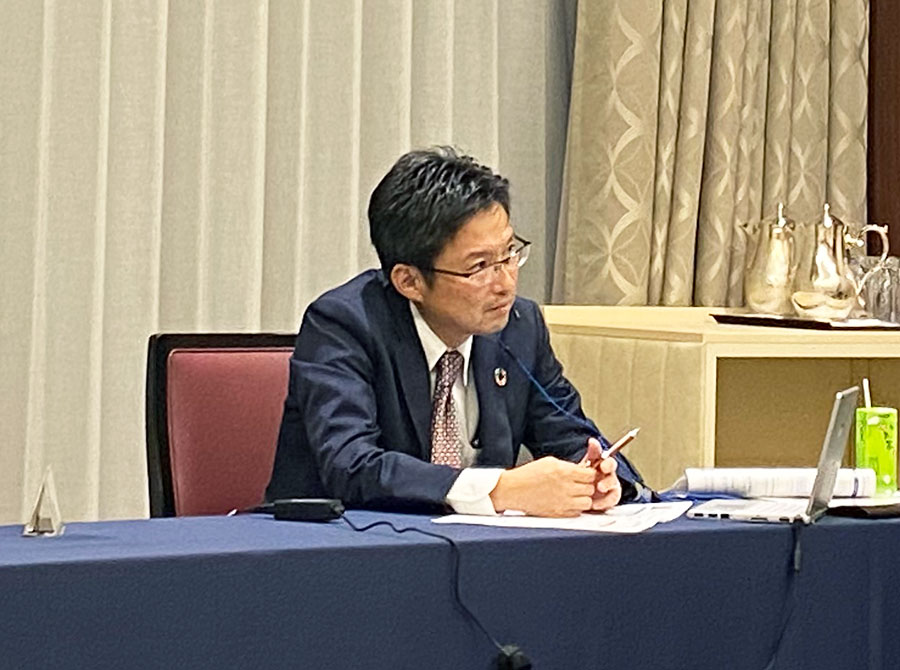
Ms. Camille Le Pors:
We believe that COVID-19 has not created new human rights risks, but has aggravated existing risks and exposed potential risks. For example, preexisting human rights risks such as problems regarding workplace safety and health and fair wages are worsening or becoming apparent in various countries and industries. When new risks occur, it is necessary to consider how to rectify those risks together with existing risks.

Yokoyama(NRI):Are there any points for improvement that can be expected in the human rights activities of Japanese companies?
Ms. Camille Le Pors:
Although this issue is not limited to Japanese companies, we believe that there is a lack of transparency in the various steps of human rights due diligence.
When CHRB evaluates activities regarding human rights, it looks at three points: whether a company formulates policies, whether the internal systems of the company follow those policies, and whether the company promotes activities according to those policies. In regard to the final point, we feel that many companies provide insufficient disclosure.
We request concrete disclosure. For example, this includes information on the execution of internal systems and processes according to policies, and the status of improving the situation of local stakeholders that are affected.
We also believe that there is insufficient disclosure regarding how effective remedies are provided to counter human rights risks.
It feels like many companies are resistant to the idea of openly discussing risks. We request transparent disclosure from companies based on the following three reasons, and would like you to actively disclose the risks of your own company.
- The first reason is that because all stakeholders including investors know that risks exist, a company that does not disclose its risks means that it is failing to perform risk management, rather than it not having any risks.
- The second reason is to share best practices with many companies.
- The third reason is because it is difficult to solve problems in the entire supply chain with the efforts of one company alone. Doing so requires partnerships (cooperation), and transparent disclosure and information sharing are important for this.
Approach for a grievance mechanism
Yokoyama(NRI):We are thinking about establishing a complaint handling mechanism. Are there any points we should take into consideration?
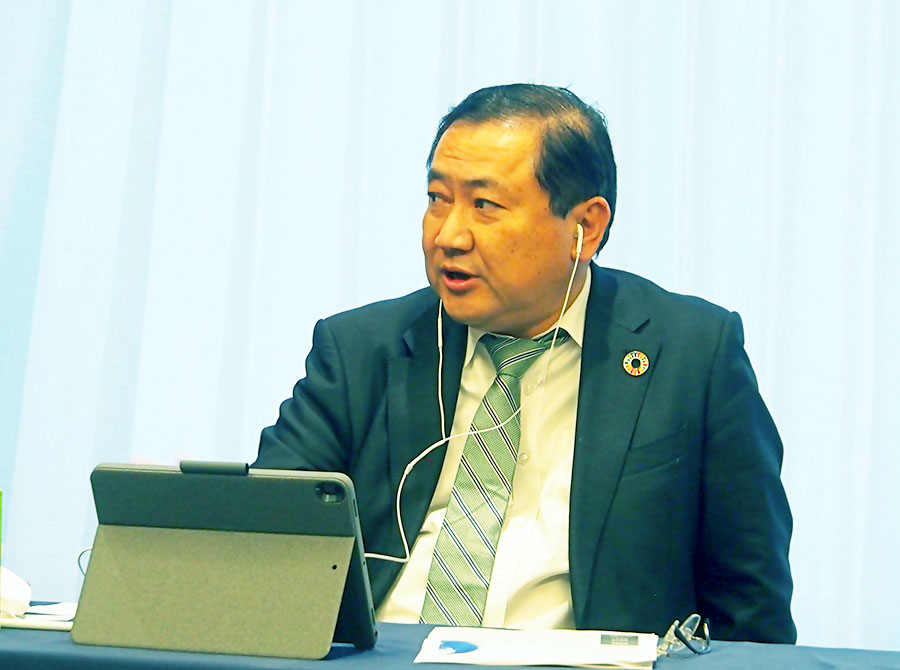
Ms. Camille Le Pors:
There are following six points to be taken into consideration.
1:Accessibility
All stakeholders must be able to access the complaint handling mechanism. This includes regular employees, non-regular employees, the supply chain, and business partners. It is also necessary to enable external stakeholders that are affected by the company, such as customers, to access the mechanism.
It is also desirable that family members are included. The goal of establishing a complaint handling mechanism is to provide a system that enables stakeholders that may be negatively affected by corporate activities to make a complaint when they are actually affected. We believe that it is important that one's family is able to access the mechanism when To ensure this, a grievance mechanism should be designed to ensure accessibility. To the extent that an individual would be unable to make a complaint themselves due to injury, for example, members of their family or legitimate representatives should be able to access the mechanism.
2:Reflecting stakeholder opinions
It is important to reflect the opinions of affected stakeholders in the design. This is because designing the mechanism without reflecting opinions can cause poor usability and lead to the system not being used.
3:Ensuring anonymity
It is necessary to link with third party organizations and ensure the anonymity of whistleblowers.
4:Language
This is related to accessibility, but it is necessary to provide and disseminate information in all the necessary languages so that all of the target stakeholders can access the information.
5:Process transparency
It is necessary to disclose information on the process that is followed when a complaint is made, what happens, and how long it takes to receive a response, etc.
6:Verifying effectiveness
It is important to disclose how the complaint handling mechanism is functioning. Please disclose how many complaints were made via the mechanism, the number that were solved, and trends behind the types of complaint. We would also like you to disclose information on how the complaints impacted human rights due diligence.

Honda(NRI):In Japan, people do not readily switch jobs, so people tend to work at the same company for a long time. Therefore, many problems relating to human rights are solved inside the organization. This means that there may be a small number of official complaints. How should one disclose information in this case?
Ms. Camille Le Pors:
We believe that there is no problem with things being solved peacefully within the organization. Transparency can be ensured by disclosing information on the number of complaints that arise via the official mechanism together with information on the cases that were solved internally.
However, even if cases can be solved internally, a grievance mechanism is still required. If, for example, an employee is harassed by their superior, it is difficult to discuss this within the organization using the regular lines of communication. That is why it is important to have a separate mechanism for handling complaints that ensures anonymity.
Yokoyama(NRI):
Thank you very much for your valuable opinions. This dialog made it clearer what is expected of an ICT company like NRI in order to achieve the goals defined in the SDGs. In the Medium-Term Management Plan (2019-2022), NRI aims to contribute to building sustainable futures by solving the problems facing society. There is no doubt that digital transformation will continue to proceed like never before. NRI hopes to contribute to solving problems facing society and our customers by generating innovative social infrastructure and new business processes. We believe that the activities of the NRI Group will lead to digital transformation.
(Published in 28, Jan. 2020)
- Materiality Topics
- Value Creation
- Value Creation Capital
- Management Basis (ESG)


